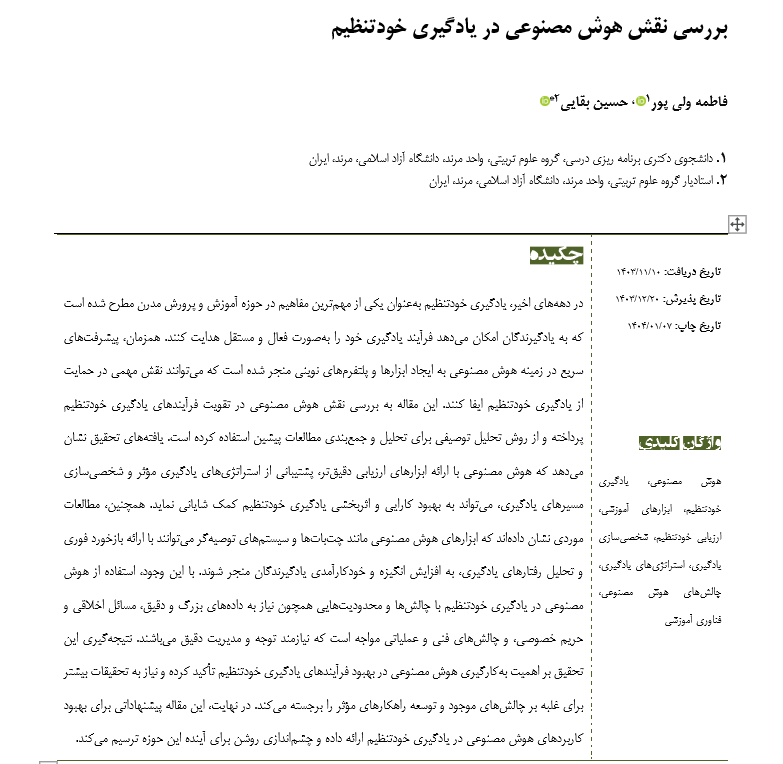Examining the Role of Artificial Intelligence in Self-Regulated Learning
Keywords:
Artificial Intelligence, Self-regulated Learning, Educational Tools, Self-regulation Assessment, Learning Personalization, Learning Strategies, AI Challenges, Educational TechnologyAbstract
In recent decades, self-regulated learning has emerged as one of the most significant concepts in modern education, empowering learners to actively and independently manage their learning process. At the same time, rapid advancements in artificial intelligence have led to the creation of innovative tools and platforms that can play a crucial role in supporting self-regulated learning. This article examines the role of artificial intelligence in enhancing self-regulated learning processes and employs a descriptive analysis of previous studies. The findings suggest that artificial intelligence, through tools for more accurate assessment, support for effective learning strategies, and the personalization of learning pathways, can significantly improve the efficiency and effectiveness of self-regulated learning. Additionally, case studies have shown that AI tools such as chatbots and recommendation systems, by providing instant feedback and analyzing learning behaviors, can increase motivation and self-efficacy among learners. However, the use of AI in self-regulated learning faces challenges and limitations, such as the need for large and accurate data, ethical issues, privacy concerns, and technical and operational challenges that require careful attention and management. The conclusion emphasizes the importance of employing artificial intelligence to enhance self-regulated learning processes, highlighting the need for further research to overcome existing challenges and develop effective solutions. Finally, the article offers recommendations for improving AI applications in self-regulated learning and outlines a promising future for this field.
Downloads
References
Chang DH. Educational Design Principles of Using AI Chatbot That Supports Self-Regulated Learning in Education:
Goal Setting, Feedback, and Personalization. Sustainability. 2023;15(17):12921. doi: 10.3390/su151712921.
Järvelä S, Nguyen A, Hadwin AF. Human and Artificial Intelligence Collaboration for Socially Shared Regulation in
Learning. British Journal of Educational Technology. 2023;54(5):1057-76. doi: 10.1111/bjet.13325.
Du H. Exploring the Effects of AI Literacy in Teacher Learning: An Empirical Study. Humanities and Social Sciences
Communications. 2024;11(1). doi: 10.1057/s41599-024-03101-6.
Hartley K. Artificial Intelligence Supporting Independent Student Learning: An Evaluative Case Study of ChatGPT
and Learning to Code. Education Sciences. 2024;14(2):120. doi: 10.3390/educsci14020120.
Ng DTK. Empowering Student Self‐regulated Learning and Science Education Through ChatGPT: A Pioneering Pilot
Study. British Journal of Educational Technology. 2024;55(4):1328-53. doi: 10.1111/bjet.13454.
Chiu TKF. A Classification Tool to Foster Self-Regulated Learning With Generative Artificial Intelligence by
Applying Self-Determination Theory: A Case of ChatGPT. Educational Technology Research and Development.
;72(4):2401-16. doi: 10.1007/s11423-024-10366-w.
Jin S-H, Im K, Yoo M, Roll I, Seo K. Supporting Students’ Self-Regulated Learning in Online Learning Using
Artificial Intelligence Applications. International Journal of Educational Technology in Higher Education. 2023;20(1). doi:
1186/s41239-023-00406-5.
Capinding AT. Development and Validation of Instruments for Assessing the Impact of Artificial Intelligence on
Students in Higher Education. International Journal of Educational Methodology. 2024;volume-10-2024(volume-10-issue-2-
may-2024):197-211. doi: 10.12973/ijem.10.2.997.
Wu TT, Lee HY, Li P-H, Huang C-N, Huang YM. Promoting Self-Regulation Progress and Knowledge Construction
in Blended Learning via ChatGPT-Based Learning Aid. Journal of Educational Computing Research. 2023;61(8):3-31. doi:
1177/07356331231191125.
Song D. Artificial Intelligence for Human Learning: A Review of Machine Learning Techniques Used in Education
Research and a Suggestion of a Learning Design Model. American Journal of Education and Learning. 2024;9(1):1-21. doi:
55284/ajel.v9i1.1024.
Yang Y. Enhancing Students' Metacognition via AI-Driven Educational Support Systems. International Journal of
Emerging Technologies in Learning (Ijet). 2023;18(24):133-48. doi: 10.3991/ijet.v18i24.45647.
Wei L. Artificial Intelligence in Language Instruction: Impact on English Learning Achievement, L2 Motivation, and
Self-Regulated Learning. Frontiers in Psychology. 2023;14. doi: 10.3389/fpsyg.2023.1261955.
Yan W. Benefits and Challenges of Collaboration Between Students and Conversational Generative Artificial
Intelligence in Programming Learning: An Empirical Case Study. Education Sciences. 2024;14(4):433. doi:
3390/educsci14040433.
Qiao H. Artificial Intelligence-Based Language Learning: Illuminating the Impact on Speaking Skills and SelfRegulation in Chinese EFL Context. Frontiers in Psychology. 2023;14. doi: 10.3389/fpsyg.2023.1255594.
Molenaar I. The Concept of Hybrid Human-Ai Regulation: Exemplifying How to Support Young Learners’ SelfRegulated Learning. Computers and Education Artificial Intelligence. 2022;3:100070. doi: 10.1016/j.caeai.2022.100070.
Molenaar I, Mooij Sd, Azevedo R, Bannert M, Järvelä S, Gašević D. Measuring Self-Regulated Learning and the Role
of AI: Five Years of Research Using Multimodal Multichannel Data. Computers in Human Behavior. 2023;139:107540. doi:
1016/j.chb.2022.107540.
Hopfenbeck TN. Challenges and Opportunities for Classroom-Based Formative Assessment and AI: A Perspective
Article. Frontiers in Education. 2023;8. doi: 10.3389/feduc.2023.1270700.
Jia X-H. Towards a New Conceptual Model of AI-Enhanced Learning for College Students: The Roles of Artificial
Intelligence Capabilities, General Self-Efficacy, Learning Motivation, and Critical Thinking Awareness. Systems.
;12(3):74. doi: 10.3390/systems12030074.

Downloads
Published
Submitted
Revised
Accepted
Issue
Section
License
Copyright (c) 2025 Journal of Study and Innovation in Education and Development

This work is licensed under a Creative Commons Attribution-NonCommercial 4.0 International License.










